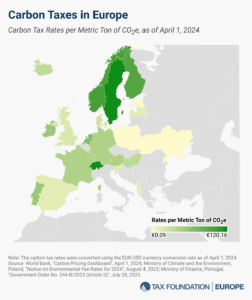
Tax Files under New Council of EU Presidency: Hungary
6 min readBy: ,On 1 July 2024, Hungary will take over the six-month rotating presidency of the Council of the European Union from Belgium. In the aftermath of the European elections, the relationship between taxA tax is a mandatory payment or charge collected by local, state, and national governments from individuals or businesses to cover the costs of general government services, goods, and activities. policy and Europe’s competitiveness will be closely linked.
What Is the State of Play of European Tax Policy?
During its presidency, Belgium prioritized measures aimed at curbing tax evasion, tax avoidance, aggressive tax planning, and “harmful” tax competition. In practice, this meant tackling tax abuse related to withholdingWithholding is the income an employer takes out of an employee’s paycheck and remits to the federal, state, and/or local government. It is calculated based on the amount of income earned, the taxpayer’s filing status, the number of allowances claimed, and any additional amount of the employee requests. taxes, propelling both legislative and non-legislative initiatives to decrease compliance costs for cross-border investors, and updating the EU’s list of non-cooperative jurisdictions.
Agreement on the FASTER Directive
In May 2024, the Council reached an agreement on safer and faster procedures to obtain double taxationDouble taxation is when taxes are paid twice on the same dollar of income, regardless of whether that’s corporate or individual income. relief—the FASTER Directive. This Directive aims to boost cross-border investment and combat tax abuse.
It includes a common EU digital tax residence certificate and two fast-track procedures that complement the current refund procedures in each Member State. Member States may choose from a relief at source system, a quick refund system, or a combination of both. It also introduces National Registers for financial intermediaries to facilitate the fast-track procedures.
Member States will need to transpose the Directive into national legislation by 31 December 2028, and apply the rules starting 1 January 2030.
A Frozen VAT in the Digital Age Proposal
Beyond agreement on the FASTER Directive, Belgium focused on the VAT in the Digital Age (ViDA) proposal. However, representatives of the Economic and Financial Affairs Council of the EU (ECOFIN Council) failed to reach an agreement in its June 21st summit over Estonian concerns about deemed supplier rules.
In its current form, ViDA’s deemed supplier rules are not neutral and could lead to double taxation. Until these neutrality and double taxation issues are resolved, unanimity appears unlikely. Furthermore, this file is not mentioned as a priority under the Hungarian presidency of the Council, which could mean the proposal is on hold until further notice.
Updates from the ECOFIN Report
The Belgian presidency undertook technical work on most of the tabled proposals. On 21 June 2024, ECOFIN approved a report to the European Council providing an overview of the progress achieved under the presidency.
With regards to the Council Directive implementing a Head Office Tax system for micro, small, and medium-sized enterprises (the HOT proposal), Member States currently think more general discussions are necessary at this stage before any technical progress can be made, including a high-level discussion on the policy choices.
The Business in Europe: Framework for Income Taxation (BEFIT) proposal has not progressed due to concerns over its goals and the interactions between BEFIT and pre-existing rules, such as Pillar Two and anti-abuse measures. Indeed, BEFIT would not share the same tax baseThe tax base is the total amount of income, property, assets, consumption, transactions, or other economic activity subject to taxation by a tax authority. A narrow tax base is non-neutral and inefficient. A broad tax base reduces tax administration costs and allows more revenue to be raised at lower rates. as Pillar Two rules, further increasing the compliance and administrative burden of the proposal.
The presidency also reached a common position for the first substantive session of the Ad Hoc Committee to draft terms of reference for a United Nations Framework Convention on International Tax Cooperation and worked on the revision of the Energy Taxation Directive (ETD).
Under the presidency, the EU list of non-cooperative jurisdictions for tax purposes was also updated in February 2024, as part of the work of the Code of Conduct Group (Business Taxation).
The report also details some of the priorities of the High-Level Working Party for the next legislative cycle, citing the importance of fighting tax avoidance and tax evasion by making taxation simple and effective, limiting the administrative burden for individuals, companies, and tax administrations. In this regard, policymakers discussing current proposals—like BEFIT—should pay attention to the interaction of the proposed tax base with other pre-existing rules (like GloBE).
Pillar Two Implementation
European tax policy continues to be shaped by different countries’ implementation of the EU’s Minimum Tax Directive (Pillar Two). Under the EU’s Directive, Member States must implement the income inclusion rule (IIR) and the undertaxed profits rule (UTPR). Implementing legislation has been fully enacted by almost all EU Member States, except for Spain, Poland, and Portugal, whose laws remain to be formally approved, consulted, or presented, respectively. Five Member States (Estonia, Latvia, Lithuania, Malta, and Slovakia) have also been granted the option to defer implementation.
What Are the Hungarian Presidency Priorities?
Hungary’s presidency will be shaped by the results of the European elections, and the careful balancing of political and technical work.
The Role of Efficiency and Competitiveness
Hungary will engage with the Commission’s proposals from a unique perspective. In its priorities, Hungary stresses the importance of “effectively [advancing] discussions on the taxation files and international issues currently on the agenda, achieving progress which responds to the needs posed by new business models, international cooperation, and fiscal revenues.”
Tax evasion, legal certainty for taxpayers, and the support of the international engagement of the EU are some of the Hungarian presidency’s key priorities.
Most importantly, Hungary views taxation as a tool to enhance the competitiveness of European businesses through digitalization, the efficient use of information, and simplification.
Avoiding Double Taxation and Decluttering Current Rules
With many unresolved issues with the tabled proposals, Hungary will have to prioritize the files and focus on resolving the concerns of Member States, such as double taxation and the non-neutrality of the ViDA proposal, if it wishes to reach unanimity.
Using information efficiently is an important goal. In this regard, decluttering international and European tax rules, such as DAC6, could play an important role in simplifying and reducing compliance costs for European businesses, helping them devote their resources towards measures that increase their competitiveness instead.
What’s Next for European Tax Policy?
European tax policy needs clear direction. Rotating presidencies, while addressing numerous proposals and issues, must clearly define their priorities and resolve the concerns raised by Member States. Without this clarity and resolution, reaching an agreement may be difficult.
As the Hungarian presidency considers a plan to manage these tax-related files, it should consider principled tax policy. For example, while improving value-added tax (VAT) compliance can generate revenue, focusing on the actionable VAT policy gap—the additional VAT revenue that could realistically be collected by eliminating reduced rates and certain exemptions—would be even more beneficial to EU and national budgets, as it can more than triple revenues from the compliance gap.
As an honest broker, Hungary is expected to steer negotiations on these proposals among Member States to reach unanimity. But holding the rotating presidency carries significant responsibility, especially as intra-EU dynamics change in a post-election semester. As such, principled tax policy should continue to be viewed as an important tool for a more competitive European Union.
Stay informed on the tax policies impacting you.
Subscribe to get insights from our trusted experts delivered straight to your inbox.
Subscribe
